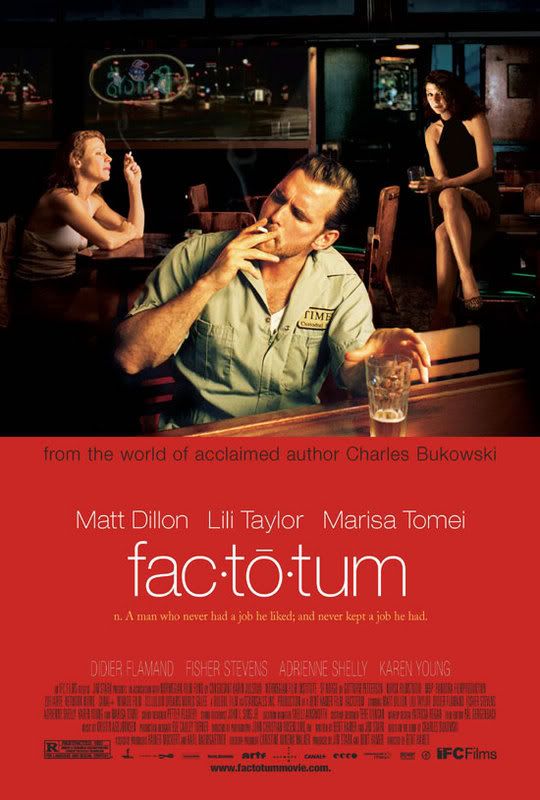Factotum
 Factotum ***
Factotum ***I'll start with the fact that I have never read anything by Charles Bukowski, but after seeing this, and hearing my dear old father rave about his novels, I've decided that is the first thing that I am going to do next month, when I venture into a new novel. I've heard that his books often involve the characters drinking, and drinking alot. They also are more like little tiny episodes as opposed to actual stories. And that is much like the pacing and style of "Factotum," which is loosely based on the author himself. One must walk into "Factotum," not expecting an actual story, with great development, plot twists, etc, but instead, to see something more like little tiny vignettes in the life of a man, who drinks and drinks and drinks.
Matt Dillion gives an amazing preformance as Henry Chinaski, who continues to find new jobs for himself in the newspaper. Small job, really. One of them is a delivery man for a company that sells ice. Another is working in a bike repair shop. One is a job at a pickle factory, which he claims he wanted because pickles always reminded him of his grandmother, who used to serve him pickles whenever he visited her. He even gets a job dusting a giant marble statue in a newspaper building. However, he always ends up getting fired, and it's always for the same reason. One his breaks, or even when he's supposed to be working, Henry ends up making a quick stop at the bar for a few shots of some drink or the other. In his spare time, he writes numerous short stories, even submitting many of them to the New Yorker, and other magazines. Henry keeps drifting through life, until he meets Jan in a bar, and three days later he's moving in with her. And the two have their ups and downs. She likes it better when he is jobless, and they could do it all day, drink all night, and then do both of them again in between. Over time, he ends up calling it off with Jan, and ends up dating Laura, but he soon goes back to Jan again, only he finds that things are must different this time.
"Factotum" is an odd film, because of it's very slow pacing. It doesn't really ever have scenes that advance the plot, but unlike "Trust the Man" which had the same method, it doesn't affect the audience in a negative way. It's meant to be told in this episodic way, because that is the way that Bukowski would write his novels. There is an extended scene where Chinaski finds out that Jan gave him crabs. He goes to the pharmacy, where the woman gives him the directions on how to use the medicine in such a loud voice that everybody in the entire store can hear. Now, what is the point of this? Why bother introducting a subplot where the main character gets crabs? The answer is simple: It's just like life-just one thing after another. And these little incidents, these vignettes, really are welcome, because they are always something creative, and strange, and random, and fun to watch, just like they would happen in life. Dillion inhabits the character of Chinaski, and is pitch perfect. Every single line, Dillion delivers with such patience and such expertise. He really becomes this guy, and something I can't believe how far Dillion has come since the 80's when he starred in "The Outsiders." It's beyond me. And the film is very funny too. Sure, it's about a drunk, but it never has any scenes where he is waking up in the middle of the night, sweating, or going to bar, and making a scene by throwing glasses and getting in various barfights. Because unlike the Hollywood cliche that is around, not all drunks have to be angry. This one isn't for everyone, but it's funny, entertaining, and worth a look. I hope that Dillion isn't overlooked come award season, because he is at the top of his game too. Also, points for indie siren Lili Taylor, who I had thought disappeared off the face of the Earth there for a while. Maybe she's making some kind of comeback. . .

0 Comments:
Post a Comment
Subscribe to Post Comments [Atom]
<< Home